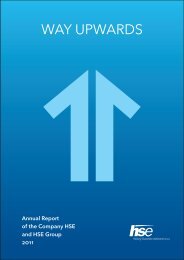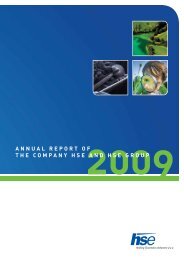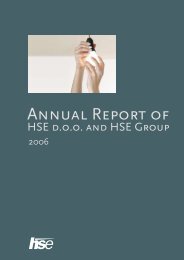ANNUAL REPORT - HSE
ANNUAL REPORT - HSE
ANNUAL REPORT - HSE
You also want an ePaper? Increase the reach of your titles
YUMPU automatically turns print PDFs into web optimized ePapers that Google loves.
in March 2008 and which was recorded as disputed in<br />
2007. The receivable in question relates to the provision<br />
system services.<br />
The company had no receivables due from management<br />
and Supervisory Board members at the end of 2008.<br />
Electricity-related trade receivables arising from annual<br />
contracts are mostly secured with bills of exchange<br />
or bank guarantees. Such are the receivables<br />
that exceed customer limits. Receivables from certain<br />
customers are regulated in detail using the EFET<br />
Agreements, whereas in other cases collateralisation<br />
is not required due to customers’ strategic position<br />
and/or financial stability. For each customer, the decision<br />
whether a security is required is taken on the<br />
basis of System Credit Risk Management Instructions<br />
and System Credit Risk Identification and Monitoring<br />
Instructions, which, among other things, lay down the<br />
setting of limits and monitoring of their utilisation.<br />
Short-term electricity trading is carried out through<br />
exchanges (in this case receivables are already secured<br />
by the obligatory membership system), through<br />
trading portals and bilateral agreements. In the latter<br />
case, the EFET Agreements are concluded with most<br />
of the customers, except in the case of receivables for<br />
which collateralisation is not required due to customers’<br />
specifics circumstances, as is the case with trading<br />
under annual contracts, or when receivables are<br />
secured with counter guarantees because a limit for a<br />
certain customer has been exceeded.<br />
The collateralisation of other receivables is not required<br />
due to their specific nature.<br />
In our opinion, the trade receivables risk is well managed<br />
thanks to the above-mentioned measures.<br />
Short-term operating receivables<br />
in €<br />
TYPE OF RECEIVABLE 31/12/08 31/12/07<br />
Short-term trade receivables in Slovenia 66,625,301 92,913,776<br />
Short-term foreign trade receivables 32,565,626 30,304,798<br />
Short-term advances for services in Slovenia not yet provided 2,743,872 690,557<br />
Short-term advances for services abroad not yet provided 7,500 0<br />
Short-term receivables from operations for third party account 614,709 41,473<br />
Short-term receivables associated with finance income 181,706 181,762<br />
Short-term receivables from the state 24,046,748 28,110,024<br />
Short-term receivables from others 712,400 2,841,524<br />
Total short-term operating receivables 127,497,862 155,083,914<br />
Short-term operating receivables from group companies<br />
in €<br />
GROUP COMPANIES 31/12/08 31/12/07<br />
Dravske elektrarne Maribor d.o.o. 8,592 75,670<br />
Soške elektrarne Nova Gorica d.o.o. 8,592 2,701<br />
Premogovnik Velenje d.d. 852,737 481,319<br />
HESS d.o.o. 59,956 0<br />
<strong>HSE</strong> Balkan Energy d.o.o. 22,396 88,945<br />
<strong>HSE</strong> Hungary Kft. 613,687 2,260,121<br />
<strong>HSE</strong> Adria d.o.o. 27,993 17,917<br />
<strong>HSE</strong> Bulgaria EOOD 19,785 6,000<br />
<strong>HSE</strong> Italia S.r.l. 1,451 1,451<br />
Total short-term operating receivables from group companies 1,615,189 2,934,124<br />
<strong>ANNUAL</strong> <strong>REPORT</strong> <strong>HSE</strong> | FINANCIAL <strong>REPORT</strong> OF THE COMPANY <strong>HSE</strong><br />
121
















